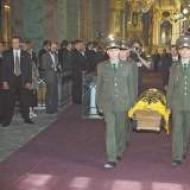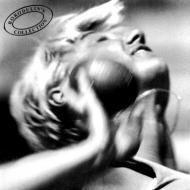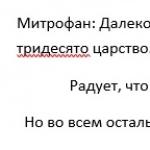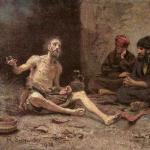
An analysis of an episode of a dramatic work of undergrowth. "Undergrowth": analysis of the work of Fonvizin, images of heroes. Announcement of the topic of the lesson, goals, problems
The material proposed in the article will help seventh-graders to correctly and comprehensively analyze not only the episode of D.I. The theoretical concepts introduced in the first part of the article, devoted to the second section "Satire and Humor in Literature", receive practical application here.
Analysis of the episode "Mitrofanushka's Exams"
- Sarcasm- caustic mockery, the highest degree of irony and satire.
- Grotesque- Violation of lifelikeness; an absurd and illogical combination of artistic details and images.
- Irony hidden laughter.
- Hyperbola- an exaggeration.
- assimilation- the use of comparison when creating a comic. The technique of likening a person to a pet for satirical ridicule of ignorance in the comedy "Undergrowth".
The comedy of this phrase is that Mitrofan does not study at all, he is looking for various excuses to get rid of lessons and teachers.
Discrepancy - what Prostakova says about her son and what really is.
You should know well the meaning of the words "ignorant" and "ignorant"
These are paronyms
Ignorant - a rude, ill-mannered person
An ignoramus is a poorly educated, little-informed person (according to the dictionary of S.I. Ozhegov )
Pravdin turns to Mitrofan with the question: “Are you far in history?”

The comedy of this line is that the word "story"- multi-valued, has 7 meanings.
In what sense does Mitrofan use the word "history"?
- Reality in its development
- The science of social development
- The course of development, the movement of something (the story of our friendship)
- The past preserved in the memory of mankind
- The science of the development of some field of knowledge
- Storytelling (narrative)
- Incident, mostly unpleasant, scandal (colloquial) - That's the story!

By the way, the surname “Vralman”, the name Adam Adamych, the name Khavronya (the distorted name “Fevronya”) are “talkers”, characterizing the human qualities of both the teacher and the narrator, which also creates a comic effect. Mitrofan - Greek name, translated means "like a mother."
The occupation of Khavronya is a cowgirl (“a worker caring for livestock”). The words "cattle", "bestial" constantly sound in Prostakova's speech as abusive, contemptuous. One can imagine what kind of “stories” Khavronya told.
Prostakova persuades her beloved son not to be stubborn, but to show himself
("show yourself" - phraseological phrase denoting the manifestation of one's qualities and abilities to the fullest).
He asks his son to answer all questions for the sake of profit.
He can tell a fictional dream about the beatings that his beloved mother rewards an unrequited father, be rude to the nanny who nursed him. But in the sciences - he did not succeed. But not because he can't. Most likely he doesn't want to.
The mother’s request calls out indignation from him: “Come on, like a knife to the throat ". This phraseological turn means to achieve something "persistently, relentlessly, obsessively" and is labeled "colloquial".
Mitrofan perceives the request as an insult. After all, he experienced the real torment of teaching.

Why is geography needed?
Starodum remarks that knowledge of geography will help to navigate the trip.
Prostakov: “What are cab drivers for? It's their business. And science is not noble.”
The expression has become catchy.
At the end of Prostakova’s statement, the “crown” phrase sounds: "... that's nonsense that Mitrofanushka doesn't know."
Episode Purpose: to show the measure of ignorance of the Skotinins breed, illiterate in the truest sense of the word: they cannot read and write.
In the final self-exposing monologue Prostakova confesses her most intimate thoughts. Her phrase - "Without the sciences people live and lived" - is not unexpected for us. After all, we, the readers, have seen that Mitrofan's education is formal. The teachers gave nothing to the underage. Yes, and they themselves do not know and do not understand much. Science is not included in the list of Skotinins' values.

Scary Mitrofan? Ridiculous? Harmless? Dangerous?
Let us turn to Mitrofan's remark: "To be taken for people?" Read: deal with the serfs?
A worthy descendant of the Skotinins. Not only the future, but also a real cruel serf-owner.
The pathos of comedy is satirical
The comedy is based on an artistic technique called antithesis (opposition, contrast) - enlightened virtuous nobles (Starodum, Pravdin) and ignorant malevolent landowners (Prostakova, Skotinin) are opposed to each other.
A.L. Murzina, honored teacher of Kaz. SSR,
teacher-methodologist of NP secondary school "Lyceum" Stolichny
The history of the creation of Fonvizin's work "Undergrowth"
DI. Fonvizin is one of the most prominent figures in the educational movement in Russia in the 18th century. He perceived the ideas of enlightenment humanism especially sharply, he lived in the power of ideas about the high moral duties of a nobleman. Therefore, the writer was especially upset by the failure of the nobles to fulfill their duty to society: “I happened to travel around my land. I saw in what most of those bearing the name of a nobleman believe their piety. I have seen many such who serve, or, moreover, take places in the service for the sole reason that they travel by steam. I saw many others who immediately retired as soon as they won the right to harness quadruplets. I have seen from the most respectable ancestors contemptuous descendants. In a word, I saw noblemen servile. I am a nobleman, and this is what tore my heart to pieces.” So Fonvizin wrote in 1783 in a letter to the writer of "Tales and Fables", the authorship of which belonged to Empress Catherine II herself.
Fonvizin's name became known to the general public after he created the comedy Brigadier. Then for more than ten years the writer was engaged in state affairs. And only in 1781 he completed a new comedy - "Undergrowth". Fonvizin left no evidence of the creation of the "Undergrowth". The only story dedicated to the creation of the comedy was written down much later by Vyazemsky. We are talking about the scene in which Eremeevna protects Mitrofanushka from Skotinin. “They retell from the words of the author himself that, embarking on the mentioned phenomenon, he went for a walk in order to think over it during a walk. At the Butcher's Gate he came across a fight between two women. He stopped and began to guard nature. Returning home with the prey of observations, he outlined his appearance and included in it the word of the hook, overheard by him on the battlefield ”(Vyazemsky, 1848).
Catherine's government, frightened by Fonvizin's first comedy, for a long time opposed the production of the writer's new comedy. Only in 1782, Fonvizin's friend and patron N.I. Panin, through the heir to the throne, the future Paul I, with great difficulty nevertheless managed to achieve the production of "Undergrowth". The comedy was performed in a wooden theater on the Tsaritsyn meadow by the actors of the court theater. Fonvizin himself took part in learning the roles of the actors, he entered into all the details of the production. The role of Starodum was created by Fonvizin based on the best actor of the Russian theater I.A. Dmitrevsky. Possessing a noble, refined appearance, the actor constantly occupied the role of the first hero-lover in the theater. And although the performance was a complete success, shortly after the premiere, the theater, on the stage of which The Undergrowth was first staged, was closed and disbanded. The attitude of the empress and the ruling circles towards Fonvizin changed dramatically: until the end of his life, the author of The Undergrowth felt from that time on that he was a disgraced, persecuted writer.
As for the name of the comedy, the very word "undergrowth" is perceived today not as intended by the author of the comedy. At the time of Fonvizin, this was a completely definite concept: this was the name of the nobles who did not receive proper education, who were therefore forbidden to enter the service and marry. So the undersized could be more than twenty years old, while Mitrofanushka in Fonvizin's comedy is sixteen years old. With the advent of this character, the term "undergrowth" acquired a new meaning - "stupid, dumbass, teenager with limited vicious inclinations."
Genus, genre, creative method in the work of Fonvizin "Undergrowth"
Second half of the 18th century - the heyday of theatrical classicism in Russia. It is the comedy genre that becomes the most important and widespread in the stage and dramatic arts. The best comedies of this time are part of the social and literary life, are associated with satire and often have a political focus. The popularity of comedy was in direct connection with life. "Undergrowth" was created within the framework of the rules of classicism: the division of characters into positive and negative, schematism in their depiction, the rule of three unities in the composition, "speaking names". However, realistic features are also visible in the comedy: the authenticity of the images, the depiction of noble life and social relations.
The famous researcher of creativity D.I. Fonvizina G.A. Gukovsky believed that “two literary styles are fighting among themselves in The Undergrowth, and classicism is defeated. Classical rules forbade the mixing of sad, cheerful and serious motives. “In Fonvizin's comedy there are elements of drama, there are motives that were supposed to touch, touch the viewer. In The Undergrowth, Fonvizin not only laughs at vices, but also glorifies virtue. "Undergrowth" is a semi-comedy, a semi-drama. In this regard, Fonvizin, breaking the tradition of classicism, took advantage of the lessons of the new bourgeois dramaturgy of the West. (G.A. Gukovsky. Russian literature of the XVIII century. M., 1939).
Having made both negative and positive characters life-like, Fonvizin managed to create a new type of realistic comedy. Gogol wrote that the plot of "Undergrowth" helped the playwright deeply and penetratingly reveal the most important aspects of the social life of Russia, "the wounds and diseases of our society, severe internal abuses, which are exposed by the merciless power of irony in stunning evidence" (N.V. Gogol, full collection op. vol. VIII).
The accusatory pathos of the content of The Undergrowth is fed by two powerful sources equally dissolved in the structure of the dramatic action. These are satire and journalism. Destroying and merciless satire fills all the scenes depicting the lifestyle of the Prostakova family. The final remark of the Starodum, which ends the "Undergrowth": "Here are worthy fruits of malevolence!" - Gives the whole piece a special sound.
Subject
At the heart of the comedy "Undergrowth" are two problems that particularly worried the writer. This is the problem of the moral decay of the nobility and the problem of education. Understood quite broadly, education in the minds of the thinkers of the XVIII century. considered as the primary factor that determines the moral character of a person. In the views of Fonvizin, the problem of education acquired state significance, since proper education could save the noble society from degradation.
The comedy "Undergrowth" (1782) became a landmark event in the development of Russian comedy. It is a complex, well-thought-out system in which every line, every character, every word is subject to the identification of the author's intention. Having started the play as an everyday comedy of manners, Fonvizin does not stop there, but boldly goes further, to the root cause of "malice", the fruits of which are known and severely condemned by the author. The reason for the vicious education of the nobility in feudal and autocratic Russia is the established state system, which gives rise to arbitrariness and lawlessness. Thus, the problem of education turns out to be inextricably linked with the entire life and political structure of the state in which people live and act from top to bottom. Skotinins and Prostakovs, ignorant, limited in mind, but not limited in their power, can only educate their own kind. Their characters are drawn by the author especially carefully and full-bloodedly, with all life authenticity. The scope of the requirements of classicism to the comedy genre by Fonvizin was significantly expanded here. The author completely overcomes the schematism inherent in his earlier heroes, and the characters of The Undergrowth become not only real faces, but also nominal figures.
The idea of the analyzed work
Defending her cruelty, crimes and tyranny, Prostakova says: “Am I not powerful even in my people?” The noble but naive Pravdin objects to her: “No, madam, no one is free to tyrannize.” And then she suddenly refers to the law: “Not free! The nobleman, when he wants, and the servants are not free to flog; but why have we been given a decree on the freedom of the nobility? The astonished Starodum and, together with him, the author exclaim only: “The master of interpreting decrees!”
Subsequently, the historian V.O. Klyuchevsky rightly said: “It's all about the last words of Mrs. Prostakova; they have the whole meaning of the drama and the whole drama in them ... She wanted to say that the law justifies her lawlessness. Prostakova does not want to recognize any obligations of the nobility, she calmly violates the law of Peter the Great on the compulsory education of the nobles, she knows only her rights. In her person, a certain part of the nobles refuses to fulfill the laws of their country, their duty and duties. There is no need to talk about some kind of noble honor, personal dignity, faith and loyalty, mutual respect, serving the state interests. Fonvizin saw what this actually led to: state collapse, immorality, lies and venality, ruthless oppression of serfs, general theft and the Pugachev uprising. Therefore, he wrote about Catherine’s Russia: “A state in which the most respectable of all states, which is supposed to defend the fatherland, together with the sovereign and its corps to represent the nation, guided by honor alone, the nobility, already exists in name and is sold to every scoundrel who robbed the fatherland.
So, the idea of comedy: the condemnation of ignorant and cruel landowners who consider themselves full-fledged masters of life, do not comply with the laws of state and morality, the affirmation of the ideals of humanity and education.
The nature of the conflict
The conflict of the comedy lies in the clash of two opposing views on the role of the nobility in the public life of the country. Mrs. Prostakova declares that the decree “on the freedom of the nobility” (which freed the nobleman from the compulsory service to the state established by Peter I) made him “free” primarily in relation to the serfs, freeing him from all burdensome human and moral duties to society. Fonvizin puts a different look at the role and duties of a nobleman into the mouth of Starodum, the person closest to the author. According to political and moral ideals, Starodum is a man of the Petrine era, which is contrasted in the comedy with the era of Catherine.
All the heroes of the comedy are drawn into the conflict, the action, as it were, is taken out of the landowner's house, family and acquires a socio-political character: the arbitrariness of the landowners, supported by the authorities, and the lack of rights of the peasants.
Main heroes
The audience in the comedy "Undergrowth" was attracted primarily by positive characters. Serious scenes in which Starodum and Pravdin performed were received with great enthusiasm. Performances thanks to Starodum turned into a kind of public demonstration. “At the end of the play,” recalls one of his contemporaries, “the audience threw a purse filled with gold and silver onto the stage to G. Dmitrevsky ... G. Dmitrevsky, raising it, spoke to the audience and said goodbye to her” (“Art newspaper”, 1840, No. 5.) -
One of the main characters of Fonvizin's play is Starodum. In his worldview, he is the bearer of the ideas of the Russian noble Enlightenment. Starodum served in the army, fought bravely, was wounded, but bypassed with a reward. It was received by his former friend, the count, who refused to go to the active army. After retiring, Starodum tries to serve at court. Disappointed, he leaves for Siberia, but remains true to his ideals. He is the ideological inspirer of the fight against Prostakova. In reality, the associate of Starodum, official Pravdin, acts on the Prostakov estate not on behalf of the government, but “from his own feat of the heart”. The success of Starodum determined Fonvizin's decision to publish in 1788 the satirical magazine Friend of Honest People, or Starodum.
Positive characters are depicted by the playwright somewhat pale and schematically. Starodum and his associates teach from the stage throughout the play. But such were the laws of the then dramaturgy: classicism assumed the image of heroes uttering monologues-teachings "from the author." Behind Starodum, Pravdin, Sophia and Milon stands, of course, Fonvizin himself with his rich experience in state and court service and unsuccessful struggle for his noble educational ideas.
With amazing realism, Fonvizin presents negative characters: Mrs. Prostakova, her husband and son Mitrofan, the evil and greedy brother of Prostakova Taras Skotinin. All of them are enemies of enlightenment and the law, they bow only to power and wealth, they are afraid only of material strength and they are cunning all the time, they achieve their benefits by all means, guided only by their practical mind and their own interest. They simply do not have morality, ideas, ideals, any moral principles, not to mention the knowledge and respect for laws.
The central figure of this group, one of the significant characters in Fonvizin's play, is Mrs. Prostakova. She immediately becomes the mainspring driving the stage action, because in this provincial noblewoman there is some kind of powerful vitality, which is not enough not only for positive characters, but also for her lazy egoistic son and pig-like brother. “This face in the comedy is unusually well conceived psychologically and excellently sustained dramatically,” said historian V.O., an expert on the era, about Prostakova. Klyuchevsky. Yes, it is a character in the full sense of the negative. But the whole point of Fonvizin's comedy is that his mistress Prostakova is a living person, a purely Russian type, and that all the spectators knew this type personally and understood that, leaving the theater, they would inevitably meet with the prostakov ladies in real life and would be defenseless.
From morning to evening, this woman fights, puts pressure on everyone, oppresses, orders, monitors, cunning, lies, swears, robs, beats, even the rich and influential Starodum, state official Pravdin and officer Milon with a military team cannot appease her. At the heart of this living, strong, quite popular character is monstrous tyranny, fearless arrogance, greed for the material goods of life, the desire that everything be according to her liking and will. But this evil cunning creature is a mother, she selflessly loves her Mitrofanushka and does all this for the sake of her son, causing him terrible moral harm. This insane love for her offspring is our strong Russian love, which in a man who has lost his dignity is expressed in such a perverted form, in such a wonderful combination with tyranny, so that the more she loves her child, the more she hates everything that do not eat her child, ”wrote N.V. about Prostakova. Gogol. For the sake of her son's material well-being, she throws her fists at her brother, is ready to grapple with Milon armed with a sword, and even in a hopeless situation wants to buy time to bribe, threaten and appeal to influential patrons to change the official court verdict on the guardianship of her estate, announced by Pravdin. Prostakova wants her, her family, her peasants to live according to her practical reason and will, and not according to some kind of laws and rules of education: “What I want, I will put on my own.”
Place of minor characters
Other characters also act on the stage: the downtrodden and intimidated husband of Prostakov and her brother Taras Skotinin, who loves his pigs more than anything in the world, and the noble "undergrowth" - the mother's favorite, the Prostakov's son Mitrofan, who does not want to learn anything, spoiled and corrupted by maternal upbringing. Next to them are bred: the yard Prostakovs - the tailor Trishka, the serf nanny, the former breadwinner Mitrofan Eremeevna, his teacher - the village deacon Kuteikin, the retired soldier Tsifirkin, the cunning rogue German coachman Vralman. In addition, the remarks and speeches of Prostakova, Skotinin and other characters - positive and negative - all the time remind the viewer of the invisibly present behind the scenes, given by Catherine II to the full and uncontrolled power of Skotinin and Prostakov, the peasants of the Russian serf village. It is they who, remaining behind the scenes, actually become the main suffering face of the comedy, their fate casts a formidable, tragic reflection on the fate of its noble characters. The names of Prostakova, Mitrofan, Skotinin, Ku-teikin, Vralman became household names.
Plot and composition
An analysis of the work shows that the plot of Fonvizin's comedy is simple. In the family of provincial landowners Prostakov lives their distant relative - the orphaned Sophia. Sophia would like to marry the brother of Mrs. Prostakova - Taras Skotinin and the son of the Prostakovs - Mitrofan. At a critical moment for the girl, when her uncle and nephew are desperately dividing her, another uncle appears - Starodum. He is convinced of the evil nature of the Prostakov family with the help of the progressive official Pravdin. Sophia marries the man she loves - officer Milon. The estate of the Prostakovs is taken into state custody for the cruel treatment of serfs. Mitrofan is given to military service.
Fonvizin based the plot of the comedy on the conflict of the era, the socio-political life of the 70s - early 80s. 18th century This is a struggle with the serf-owner Prostakova, depriving her of the right to own her estate. At the same time, other storylines are traced in the comedy: the struggle for Sofya Prostakova, Skotinin and Milon, the story of the union of Sophia and Milon who love each other. Although they do not form the main plot.
"Undergrowth" is a comedy in five acts. Events unfold in the estate of the Prostakovs. A significant part of the dramatic action in The Undergrowth is devoted to solving the problem of education. These are the scenes of Mitrofan's teachings, the vast majority of Starodum's moralizing. The culminating point in the development of this theme, no doubt, is the scene of Mitrofan's exam in the 4th act of the comedy. This satirical picture, deadly in terms of the strength of the accusatory sarcasm contained in it, serves as a verdict on the education system of the Prostakovs and Skotinins.
Artistic originality
A fascinating, rapidly developing plot, sharp retorts, bold comic positions, individualized colloquial speech of characters, an evil satire on the Russian nobility, mockery of the fruits of the French enlightenment - all this was new and attractive. The young Fonvizin attacked the nobility and its vices, the fruits of semi-enlightenment, the plague of ignorance and serfdom that struck people's minds and souls. He showed this dark kingdom as a stronghold of heavy tyranny, everyday household cruelty, immorality and lack of culture. The theater as a means of social public satire required characters and language understandable to the audience, acute topical problems, recognizable conflicts. All this is in the famous comedy Fonvizin "Undergrowth", which is staged today.
Fonvizin created the language of Russian drama, correctly understanding it as the art of the word and a mirror of society and man. He did not at all consider this language ideal and final, but his heroes as positive characters. As a member of the Russian Academy, the writer was seriously engaged in the study and improvement of his modern language. Fonvizin skillfully builds the linguistic characteristics of his characters: these are rude, insulting words in Prostakova's uncouth speeches; the words of the soldier Tsyfirkin, characteristic of military life; Church Slavonic words and quotations from the spiritual books of seminarian Kuteikin; the broken Russian speech of Vralman and the speech of the noble heroes of the play - Starodum, Sofya and Pravdin. Separate words and phrases from Fonvizin's comedy became winged. So, already during the life of the playwright, the name Mitrofan became a household name and meant lazy and ignorant. Phraseological units have gained wide popularity: “Trishkin’s caftan”, “I don’t want to study, but I want to get married”, etc.
The meaning of the work
"Folk" (according to Pushkin) comedy "Undergrowth" reflected the acute problems of Russian life. The audience, seeing her in the theater, at first laughed heartily, but then they were horrified, experienced deep sadness and called Fonvizin's cheerful play a modern Russian tragedy. Pushkin left for us the most valuable testimony about the then spectators: “My grandmother told me that in the performance of the Undergrowth there was a crush in the theater - the sons of the Prostakovs and Skotinins, who came to serve from the steppe villages, were present here - and, consequently, they saw relatives and friends in front of them , your family." Fonvizin's comedy was a faithful satirical mirror, for which there is nothing to blame. “The strength of the impression is that it is made up of two opposite elements: laughter in the theater is replaced by heavy reflection upon leaving it,” wrote the historian V.O. Klyuchevsky.
Gogol, Fonvizin’s student and heir, aptly called The Undergrowth a truly social comedy: “Fonvizin’s comedy strikes at the coarse brutality of a person that came from a long, insensible, unshakable stagnation in the remote corners and backwoods of Russia ... There is nothing caricature in it: everything is taken alive from nature and verified by the knowledge of the soul. Realism and satire help the author of the comedy to talk about the fate of education in Russia. Fonvizin, through the mouth of Starodum, called education "the key to the welfare of the state." And all the comic and tragic circumstances described by him and the very characters of negative characters can be safely called the fruits of ignorance and malevolence.
In Fonvizin's comedy there is a grotesque, a satirical comedy, a farcical beginning, and a lot of serious things that make the viewer think. With all this, The Undergrowth had a strong influence on the development of Russian national dramaturgy, as well as on the entire “magnificent and, perhaps, the most socially fruitful line of Russian literature - the accusatory-realistic line” (M. Gorky).
It is interesting
The actors can be divided into three groups: negative (Prostakovs, Mitrofan, Skotinin), positive (Pravdin, Mil on, Sophia, Starodum), the third group includes all other characters - these are mainly servants and teachers. Negative characters and their servants are characterized by a common colloquial language. The vocabulary of the Skotinins consists mainly of words used in the barnyard. This is well illustrated by the speech of Skotinin, Uncle Mitrofan. It is full of words: a pig, pigs, a barn. The idea of life begins and ends with the barnyard. He compares his life with the life of his pigs. For example: “I want to have my own piglets”, “if I have ... a special barn for each pig, then I will find a litterbox for my wife.” And he is proud of this: “Well, if I were a pig’s son, if ...” The vocabulary of his sister, Mrs. Prostakova, is a little more diverse due to the fact that her husband is “countless fool” and she has to do everything herself. But the roots of Skotininsky are also manifested in her speech. Favorite curse word is "cattle". To show that Prostakova is not far behind her brother in development, Fonvizin sometimes denies her elementary logic. For example, such phrases: “Since we took away everything that the peasants had, we can’t tear anything off,” “So is it really necessary to be like a tailor in order to be able to sew a caftan well?”
Concerning her husband, one can only say that he is laconic and does not open his mouth without instructions from his wife. But this also characterizes him as a “countless fool”, a weak-willed husband who fell under the heel of his wife. Mitrofanushka is also laconic, however, unlike his father, he has freedom of speech. Skotinin's roots are manifested in his ingenuity of curses: "old grunt", "garrison rat". Servants and teachers have in their speech the characteristic features of the estates and parts of society to which they belong. Eremeevna's speech is constant excuses and a desire to please. Teachers: Tsyfirkin is a retired sergeant, Kuteikin is a deacon from Pokrov. And by their speech they show belonging to the occupation.
All the characters, except for the positive ones, have a very colorful, emotionally colored speech. You may not understand the meaning of the words, but the meaning of what is said is always clear.
The speech of positive characters does not differ in such brightness. All four have no colloquial, colloquial phrases in their speech. This is bookish speech, the speech of educated people of that time, which practically does not express emotions. You understand the meaning of what has been said from the immediate meaning of the words. It is almost impossible to distinguish Milon's speech from Pravdin's speech. It is also very difficult to say anything about Sophia from her speech. An educated, well-behaved young lady, as Starodum would call her, sensitive to the advice and instructions of her beloved uncle. Starodum's speech is completely determined by the fact that the author put his moral program into the mouth of this hero: rules, principles, moral laws by which a "pious person" must live. Starodum's monologues are structured in this way: Starodum first tells a story from his life, and then deduces a moral.
As a result, it turns out that the speech of the negative character characterizes him, and the speech of the positive character is used by the author to express his thoughts. The person is depicted in volume, the ideal is in the plane.
Makogonenko G.I. Denis Fonvizin. creative path M.-L., 1961.
Makogonezho G.I. From Fonvizin to Pushkin (From the history of Russian realism). M., 1969.
Nazarenko M.I. "The incomparable mirror" (Types and prototypes in the comedy "Undergrowth" by D.I. Fonvizin) // Russian language, literature, culture at school and university. K., 2005.
StrichekA. Denis Fonvizin. Russia of the Age of Enlightenment. M., 1994.
Denis Fonvizin's immortal comedy "Undergrowth" is an outstanding work of Russian literature of the 18th century. Bold satire and truthfully described reality are the main components of the skill of this writer. Centuries later, heated debates about the protagonist of the play, Mitrofanushka, emerge in modern society every now and then. Who is he: a victim of improper upbringing or a vivid example of the moral decay of society?
The comedy "The Brigadier" written by Fonvizin, which had a stunning success in St. Petersburg, became the basis of one of the world's greatest literary monuments. After its publication, the writer did not return to dramaturgy for more than ten years, more and more devoting himself to state issues and tasks. However, the idea of creating a new book excited the author's imagination. Let's not hide the fact that, according to scientists, the first note related to the "Undergrowth" was started back in the 1770s, long before its publication.
After a trip to France in 1778. the playwright had an exact plan for writing the future work. An interesting fact is that initially Mitrofanushka was Ivanushka, which by itself spoke of the similarity of the two comedies (Ivan was a character in The Brigadier). In 1781 the play was completed. Of course, staging this type meant highlighting one of the most problematic issues of the noble society of that time. However, despite the risk, Fonvizin became the direct "instigator" of the literary revolution. The premiere was postponed due to the empress's dislike for any satire, but it nevertheless took place on September 24, 1782.
Genre of the work
COMEDY is a type of drama in which a moment of effective conflict is specifically resolved. It has a number of features:
- does not entail the death of one representative from the warring parties;
- aimed at "nothing carrying" goals;
- The story is lively and vivid.
Also in the work of Fonvizin, a satirical orientation is obvious. This means that the author set himself the task of ridiculing social vices. This is an attempt to disguise life's problems under the guise of a smile.
"Undergrowth" is a work built according to the laws of classicism. One storyline, one place of action, and all events take place within a day. However, this concept is also consistent with realism, as evidenced by individual objects and places of action. In addition, the characters very much resemble real landowners from the hinterland, ridiculed and condemned by the playwright. Fonvizin added something new to classicism - merciless and sharp humor.
What is the piece about?
The plot of Denis Fonvizin's comedy "Undergrowth" revolves around a family of landowners, which is completely mired in immorality and tyranny. Children became like rude and limited parents, from which their idea of morality suffered. Sixteen-year-old Mitrofanushka is struggling to finish his studies, but he lacks the desire and ability. The mother looks at it through her sleeves, she does not care if her son develops. She prefers everything to remain as it is, any progress is alien to her.
The Prostakovs “sheltered” a distant relative, the orphan Sophia, who differs from the whole family not only in her outlook on life, but also in her good manners. Sophia is the heiress of a large estate, which Mitrofanushka's uncle, Skotinin, who is a great hunter, “looks at” as well. Marriage is the only available way to take possession of Sophia's household, so the relatives surrounding her are trying to persuade her to a profitable marriage.
Starodum - Sophia's uncle, sends a letter to his niece. Prostakova is terribly unhappy with such a "trick" of a relative who was considered dead in Siberia. The deceit and arrogance inherent in her nature is manifested in the accusation of a "fraudulent" letter, allegedly "amorous". Illiterate landowners will soon find out the true content of the message, resorting to the help of the guest Pravdin. He reveals to the whole family the truth about the left Siberian inheritance, which gives as much as ten thousand annual income.
It was then that Prostakova came up with an idea - to marry Sophia to Mitrofanushka in order to appropriate the inheritance for herself. However, officer Milon "breaks into" her plans, walking through the village with soldiers. He met with an old friend, Pravdin, who, as it turned out, was a member of the governor's board. His plans include watching the landowners mistreating their people.
Milon talks about his long-standing love for a sweet lady who was transported to an unknown place due to the death of a relative. Suddenly he meets Sophia - she is the same girl. The heroine talks about her future marriage with the undersized Mitrofanushka, from which the groom “flares up” like a spark, but then gradually “weakens” with a detailed story about the “betrothed”.
Sophia's uncle arrived. Having met Milon, he accepts Sophia's choice, while inquiring about the "correctness" of her decision. At the same time, the Prostakovs' estate was transferred to state custody due to the cruel treatment of the peasants. Looking for support, the mother hugs Mitrofanushka. But the Son did not intend to be courteous and polite, he is rude, which makes the venerable matron faint. Waking up, she wails: "I died completely." And Starodum, pointing to her, says "Here are worthy fruits of evil-mindedness!".
Main characters and their characteristics
Pravdin, Sofya, Starodum and Milon are representatives of the so-called "new" time, the Enlightenment. The moral components of their souls are nothing but goodness, love, craving for knowledge and compassion. The Prostakovs, Skotinin and Mitrofan are representatives of the "old" nobility, where the cult of material well-being, rudeness and ignorance flourish.
- The minor Mitrofan is a young man whose ignorance, stupidity and inability to adequately analyze the situation do not allow him to become an active and reasonable representative of the noble community. “I don’t want to study, but I want to get married” is a life motto that fully reflects the character of a young man who does not take anything seriously.
- Sophia is an educated, kind girl who becomes a black sheep in a society of envious and greedy people.
- Prostakova is a cunning, careless, rude woman with many flaws and a lack of love and respect for all living things, except for her beloved son Mitrofanushka. The upbringing of Prostakova is only a confirmation of the persistence of conservatism, which does not allow the development of the Russian nobility.
- Starodum brings up "his little blood" in a different way - Sophia for him is no longer a small child, but a formed member of society. He gives the girl freedom of choice, thereby teaching her the right basics of life. In it, Fonvizin portrays the type of personality that has gone through all the “ups and downs”, while becoming not only a “worthy parent”, but also an undoubted example for the future generation.
- Skotinin - just like everyone else, is an example of a "speaking surname." A person whose inner essence is more like some rough, uncouth cattle than a well-mannered person.
- The upbringing of the "new" nobility is the main theme of the comedy. “Undergrowth” is a kind of allusion to the “disappearing” moral principles in people who are afraid of transformation. The landowners bring up their offspring in the old fashioned way, without paying due attention to their education. But those who were not taught, but only spoiled or intimidated, will not be able to take care of either their families or Russia.
- Family theme. The family is a social institution on which the development of the individual depends. Despite Prostakova's rudeness and disrespect towards all residents, she cherishes her beloved son, who does not at all appreciate her care or her love. Such behavior is a typical example of ingratitude, which is a consequence of spoiled and parental adoration. The landowner does not understand that her son sees her treatment of other people and repeats exactly that. So, the weather in the house determines the character of the young man and his shortcomings. Fonvizin emphasizes the importance of maintaining warmth, tenderness and respect in the family towards all its members. Only then will children be respectful and parents worthy of respect.
- The theme of freedom of choice. The "new" stage is Starodum's relationship with Sophia. Starodum gives her freedom of choice, not limiting her to her beliefs, which can affect her worldview, thereby educating her in the ideal of a noble future.
- The main problem of the work is the consequences of improper upbringing. The Prostakov family is a family tree that has its roots in the distant past of the nobility. This is what the landlords boast about, not realizing that the glory of their ancestors does not add to their dignity. But class pride clouded their minds, they do not want to move forward and achieve new achievements, they think that everything will always be the same as before. That is why they do not realize the need for education; in their world enslaved by stereotypes, it really is not needed. Mitrofanushka will also sit all his life in the village and live off the labor of his serfs.
- The problem of serfdom. The moral and intellectual decay of the nobility under serfdom is an absolutely logical result of the unjust policy of the tsar. The landlords are completely lazy, they do not need to work to provide for themselves. Managers and peasants will do everything for them. With such a social structure, the nobles have no incentive to work and get an education.
- The problem of greed. The thirst for material well-being blocks access to morality. The Prostakovs are obsessed with money and power, they don’t care if their child is happy, for them happiness is a synonym for wealth.
- The problem of ignorance. Stupidity deprives the heroes of spirituality, their world is too limited and tied to the material side of life. They are not interested in anything but primitive physical pleasures, because they do not know anything else at all. Fonvizin saw the true "human appearance" only in the person who was brought up by literate people, and not by half-educated deacons.
Theme of the work
Main problems
comedy idea
Fonvizin was a personality, therefore he did not accept rudeness, ignorance and cruelty. He professed the belief that a person is born with a “clean slate”, therefore only upbringing and education can make him a moral, virtuous and intelligent citizen who will benefit the fatherland. Thus, the chanting of the ideals of humanism is the main idea of The Undergrowth. A young man who obeys the call of goodness, intelligence and justice - that's a true nobleman! If he is brought up in the spirit of Prostakova, then he will never go beyond the narrow limits of his limitations and will not understand the beauty and versatility of the world in which he lives. He will not be able to work for the good of society and will not leave anything significant behind him.
At the end of the comedy, the author speaks of the triumph of "retribution": Prostakova loses the estate and the respect of her own son, who was brought up in accordance with her spiritual and physical ideals. This is the price of wrong education and ignorance.
What does it teach?
Comedy Denis Fonvizin "Undergrowth", above all, teaches respect for others. The sixteen-year-old youth Mitrofanushka did not take care of either his mother or his uncle at all, he considered this a self-evident fact: “Why did you overeat henbane, uncle? Yes, I don’t know why you deigned to jump on me. The logical result of rough treatment in the house is the finale, where the son pushes away the loving mother.
The lessons of the comedy "Undergrowth" do not end there. Not so much respect as ignorance shows people in a position that they carefully try to hide. Stupidity and ignorance hover in comedy, like a bird over a nest, they envelop the village, thereby not releasing the inhabitants from their own shackles. The author severely punishes the Prostakovs for their narrow-mindedness, depriving them of their property and the very opportunity to continue their idle lifestyle. Thus, everyone needs to learn, because even the most stable position in society is easy to lose, being an uneducated person.
Interesting? Save it on your wall!Consider the features of the comedy created by Fonvizin ("Undergrowth"). The analysis of this work is the topic of this article. This play is a masterpiece of Russian literature of the 18th century. This work is included today in the fund of Russian classical literature. It touches upon a number of "eternal problems". And the beauty of a high style still attracts many readers today. The name of this play is connected with the decree issued by Peter I, according to which "undergrowths" (young nobles) are forbidden to enter the service and marry without education.
The history of the creation of the play
Back in 1778, the idea of this comedy arose from its author, who is Fonvizin. "Undergrowth", the analysis of which we are interested in, was written in 1782 and presented to the public in the same year. It should briefly highlight the time of creation of the play that interests us.
During the reign of Catherine II, Fonvizin wrote "Undergrowth". The analysis of the heroes presented below proves that they were the heroes of their time. The period in the development of our country is associated with the dominance of ideas. They were borrowed by the Russians from the French enlighteners. The spread of these ideas, their great popularity among the educated philistinism and the nobility was largely facilitated by the empress herself. She, as you know, corresponded with Diderot, Voltaire, d'Alembert. In addition, Catherine II opened libraries and schools, supported the development of art and culture in Russia by various means.

Continuing to describe the comedy created by D. I. Fonvizin ("Undergrowth"), analyzing its features, it should be noted that, as a representative of his era, the author, of course, shared the ideas that dominated at that time in the noble society. He tried to reflect them in his work, revealing not only positive aspects to readers and viewers, but also pointing out misconceptions and shortcomings.
"Undergrowth" - an example of classicism

Analysis of the comedy "Undergrowth" by Fonvizin requires considering this play as part of a cultural era and literary tradition. This work is considered one of the best examples of classicism. In the play, there is a unity of action (there are no secondary plot lines in it, only the struggle for Sophia's hand and her property is described), places (the characters do not move long distances, all events take place either near the Prostakovs' house or inside it), and time ( all events take no more than a day). In addition, he used "talking" surnames, which are traditional for the classic play, Fonvizin ("Undergrowth"). Analysis shows that, following tradition, he divided his characters into positive and negative ones. Positive ones are Pravdin, Starodum, Milon, Sophia. They are opposed to Prostakov, Mitrofan, Skotinin by D. I. Fonvizin (the play "Undergrowth"). An analysis of their names shows that they let the reader understand which features in the image of this or that character are prevalent. For example, the personification of morality and truth in the work is Pravdin.
A new genre of comedy, its features

"Undergrowth" at the time of its creation was an important step forward in the development of literature in our country, in particular, drama. Denis Ivanovich Fonvizin created a new socio-political. It harmoniously combines a number of realistic scenes depicted with sarcasm, irony, laughter from the lives of some ordinary representatives of high society (the nobility) with sermons about morality, virtue, the need to educate human qualities that were characteristic of enlighteners. At the same time, instructive monologues do not burden the perception of the play. They complement this work, as a result of which it becomes deeper.
First action
The play is divided into 5 acts, the author of which is Fonvizin ("Undergrowth"). Analysis of the work involves a description of the organization of the text. In the first act we get acquainted with the Prostakovs, Pravdin, Sofya, Mitrofan, Skotinin. The characters' characters emerge immediately, and the reader understands that the Skotinin and Prostakovs - and Sophia and Pravdin - are positive. In the first act, the exposition and the plot of this work take place. In the exposition, we get to know the characters, we learn that Sofya lives in the care of the Prostakovs, who is going to be married off as Skotinin. Reading a letter from Starodum is the beginning of the play. Sophia now turns out to be a rich heiress. From day to day, her uncle returns to take the girl to him.
The development of events in the play created by Fonvizin ("Undergrowth")
We continue the analysis of the work with a description of how events unfolded. 2nd, 3rd and 4th actions are their development. We get acquainted with Starodum and Milon. Prostakova and Skotinin are trying to please Starodum, but their flattery, falsity, lack of education and a huge thirst for profit only repels. They look stupid and funny. The most ridiculous scene of this work is Mitrofan's interrogation, during which the stupidity of not only this young man, but also his mother is exposed.
Climax and denouement
5th act - climax and denouement. It should be noted that the opinions of researchers about what moment should be considered the culmination differ. There are 3 most popular versions. According to the first, this is the abduction of Prostakova Sofya, according to the second, Pravdin’s reading of a letter stating that Prostakova’s estate is being transferred under his care, and, finally, the third version is Prostakova’s rage after she understands her own impotence and tries to “recoup "on his servants. Each of these versions is true, since it considers the work of interest to us from different points of view. The first, for example, highlights the storyline dedicated to Sophia's marriage. An analysis of the episode of Fonvizin's comedy "Undergrowth" associated with marriage, indeed, allows us to consider it the key in the work. The second version examines the play from a socio-political point of view, highlighting the moment when justice triumphs on the estate. The third focuses on the historical one, according to which Prostakova is the personification of the weakened principles and ideals of the old nobility that have gone into the past, which, however, do not yet believe in their own defeat. This nobility, according to the author, is based on ignorance, lack of education, as well as low moral standards. During the denouement, everyone leaves Prostakova. She has nothing left. Pointing to her, Starodum says that these are "worthy fruits" of "malice".
Negative characters

As we have already noted, the main characters are clearly divided into negative and positive. Mitrofan, Skotinin and Prostakov are negative characters. Prostakova is a woman seeking profit, uneducated, rude, domineering. She knows how to flatter for profit. However, Prostakova loves her son. Prostakov appears as the "shadow" of his wife. This is an inactive character. His word means little. Skotinin is the brother of Mrs. Prostakova. This is an equally uneducated and stupid person, rather cruel, like his sister, greedy for money. For him, a walk to the pigs in the barnyard is the best thing to do. Mitrofan is a typical son of his mother. This is a spoiled young man of 16 years old, who inherited from his uncle a love for pigs.
Issues and heredity

In the play, it should be noted, an important place is given to the issue of family ties and heredity Fonvizin ("Undergrowth"). Analyzing this issue, let's say, for example, that Prostakova is only married to her husband (a "simple" person who does not want much). However, she is actually Skotinina, akin to her brother. Her son absorbed the qualities of both his parents - "animal" qualities and stupidity from his mother and lack of will from his father.
Similar family ties can be traced between Sophia and Starodum. Both of them are honest, virtuous, educated. The girl listens to her uncle attentively, respects him, "absorbs" science. Pairs of opposites create negative and positive characters. Children - spoiled stupid Mitrofan and meek smart Sophia. Parents love children, but they approach their upbringing differently - Starodub talks on the topics of truth, honor, morality, and Prostakova only pampers Mitrofan and says that education is not useful to him. A couple of grooms - Milon, who sees the ideal and his friend in Sophia, who loves her, and Skotinin, who calculates the fortune that he will receive after marrying this girl. At the same time, Sophia as a person is not interesting to him. Skotinin does not even try to equip his bride with comfortable housing. Prostakov and Pravdin are in reality the "voice of truth", a kind of "auditors". But in the person of an official, we find active strength, help and real action, while Prostakov is a passive character. The only thing that this hero could say was to reproach Mitrofan at the end of the play.
Issues raised by the author

Analyzing, it becomes clear that each of the above-described pairs of characters reflects a separate problem that is revealed in the work. This is a problem of education (which is supplemented by the example of half-educated teachers like Kuteikin, as well as impostors like Vralman), upbringing, fathers and children, family life, relationships between spouses, the attitude of nobles to servants. Each of these problems is considered through the prism of enlightenment ideas. Fonvizin, sharpening his attention on the shortcomings of the era through the use of comic techniques, emphasizes the need to change outdated, traditional, irrelevant foundations. They drag foolishness, malevolence into the swamp, liken people to animals.
As our analysis of Fonvizin's play "Undergrowth" showed, the main idea and theme of the work is the need to educate the nobility in accordance with educational ideals, the foundations of which are still relevant today.
The original idea of Fonvizin's comedy "Undergrowth" was to reveal the topic of education, which was very relevant in the Enlightenment, a little later socio-political issues were added to the work.
The name of the play is directly related to the decree of Peter the Great, who banned the opportunity to serve and marry young uneducated underage nobles.
History of creation

The first manuscript sketches of The Undergrowth date from around 1770. To write the play, Fonvizin had to rework many works with the appropriate ideology - the works of Russian and foreign contemporary writers (Voltaire, Rousseau, Lukin, Chulkov, etc.), articles from satirical magazines and even comedies written by Empress Catherine II herself. The work on the text was completed in 1781. A year later, after some obstacles from censorship, the first production of the play took place, and Fonvizin himself was the director, and the first publication of the play took place in 1773.
Description of the artwork

Action 1
The scene begins with a stormy discussion of a caftan sewn for Mitrofanushka. Mrs. Prostakova scolds her tailor Trishka and Prostakov supports her in an effort to punish the negligent servant. The situation is saved by the appearance of Skotinin, he justifies the unfortunate tailor. This is followed by a comical scene with Mitrofanushka - he manifests himself as an infantile young man, who also loves to eat tightly.
Skotinin discusses with the Prostakov couple the prospects for his marriage to Sofyushka. The only relative of the girl, Starodum, unexpectedly sends news of Sophia's acquisition of an impressive inheritance. Now the young lady has no end to the suitors - now the "minor" Mitrofan appears in the list of candidates for husbands.
Action 2
Among the soldiers who stopped in the village by chance is Sofyushka's fiancé - officer Milon. He turns out to be a good friend of Pravdin, an official who came to deal with the lawlessness that is happening on the Prostakov estate. At a chance meeting with her beloved, Milon learns about Prostakova's plans to arrange the fate of her son by marrying a now wealthy girl. This is followed by a quarrel between Skotinin and Mitrofan because of the future bride. Teachers appear - Kuteikin and Tsyfirkin, they share with Pravdin the details of their appearance in the Prostakovs' house.
Action 3
Arrival of the Starodum. Pravdin first meets Sophia's relative and reports to him about the atrocities happening in the Prostakovs' house in relation to the girl. The entire host family and Skotinin greet Starodum with hypocritical joy. Uncle plans to take Sofyushka to Moscow and marry her off. The girl submits to the will of her relative, not knowing that he chose Milon as her husband. Prostakova begins to praise Mitrofanushka as a diligent student. After everyone has dispersed, the remaining teachers Tsyfirkin and Kuteikin discuss the laziness and mediocrity of their undergrowth student. At the same time, they accuse the rogue, the former stableman of Starodum, Vralman, of hindering the learning process of the already stupid Mitrofanushka with his dense ignorance.
Action 4
Starodum and Sofyushka are talking about high moral principles and family values - true love between spouses. After a conversation with Milon, having ascertained the high moral qualities of the young man, the uncle blesses his niece for marriage with her lover. What follows is a comical scene in which the unfortunate suitors Mitrofanushka and Skotinin are shown in a very unfavorable light. Having learned about the departure of a happy couple, the Prostakov family decides to intercept Sophia on the road.
Action 5
Starodum and Pravdin have pious conversations, having heard a noise, they interrupt the conversation and soon learn about the attempted kidnapping of the bride. Pravdin accuses the Prostakovs of this atrocity and threatens them with punishment. Prostakova on her knees begs for forgiveness from Sophia, but as soon as she receives it, she immediately accuses the servants of sluggishness in kidnapping the girl. A government paper arrives, announcing the transfer of all the property of the Prostakovs to Pravdin's custody. The scene of paying debts to teachers ends with a fair denouement - Vralman's deceit is revealed, the modest hard worker Tsyfirkin is generously endowed, and the ignorant Kuteikin is left with nothing. The happy young people and Starodum are getting ready to leave. Mitrofanushka heeds Pravdin's advice to join the army.
main characters
Considering the images of the main characters, it is worth noting that the speaking names of the characters in the play express the one-line nature of their character and leave no doubt about the author's moral assessment of the characters in the comedy.

The sovereign mistress of the estate, a despotic and ignorant woman, who believes that all matters, without exception, can be solved with the help of force, money or deceit.

His image is the focus of stupidity and ignorance. He has a striking lack of will and unwillingness to make decisions himself. Undergrowth Mitrofanushka was named not only because of his age, but also because of his total ignorance and low level of moral and civic education.

A kind, sympathetic girl who received a good education, has a high level of internal culture. Lives with the Prostakovs after the death of his parents. With all her heart she is devoted to her fiancé - officer Milon.

A person personifying the truth of life and the word of the law. As a government official, he is on the Prostakovs' estate in order to sort out the lawlessness that is happening there, in particular, the unfair mistreatment of servants.

Sophia's only relative, her uncle and guardian. A successful man who managed to realize his high moral principles.

Sophia's beloved and long-awaited fiance. A brave and honest young officer of high virtue.

A narrow-minded, greedy, uneducated person, who does not disdain anything for the sake of profit and is distinguished by deceit and hypocrisy to a high degree.
comedy analysis

Fonvizin's "Undergrowth" is a classic comedy in 5 acts, all three unities are strictly observed in it - the unity of time, place and action.
The solution to the problem of education is the central moment of the dramatic action of this satirical play. The accusatory sarcastic scene of Mitrofanushka's exam is a true culmination in the development of an educational theme. In Fonvizin's comedy, two worlds collide - each with different ideals and needs, with different lifestyles and speech dialects.
The author innovatively shows the landowner's life of that time, the relationship between the owners and ordinary peasant people. The complex psychological characteristics of the characters gave impetus to the subsequent development of Russian everyday comedy as a theatrical and literary genre of the era of classicism.
Hero Quotes

Mitrofanushka- “I don’t want to study, I want to get married”;
— “Direct dignity in a person is the soul” and many others.
Prostakov — « Without science, people live and lived"
Final conclusion

Fonvizin's comedy has become a unique landmark work for contemporaries. In the play there is a vivid opposition of high moral principles, real education and laziness, ignorance and waywardness. In the socio-political comedy "Undergrowth" three themes rise to the surface:
- the theme of education and upbringing;
- the theme of serfdom;
- the theme of the condemnation of despotic autocratic power.
The purpose of writing this brilliant work is clear - the eradication of ignorance, the education of virtues, the fight against the vices that struck Russian society and the state.
















